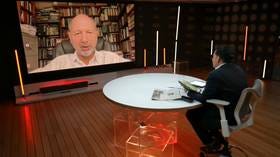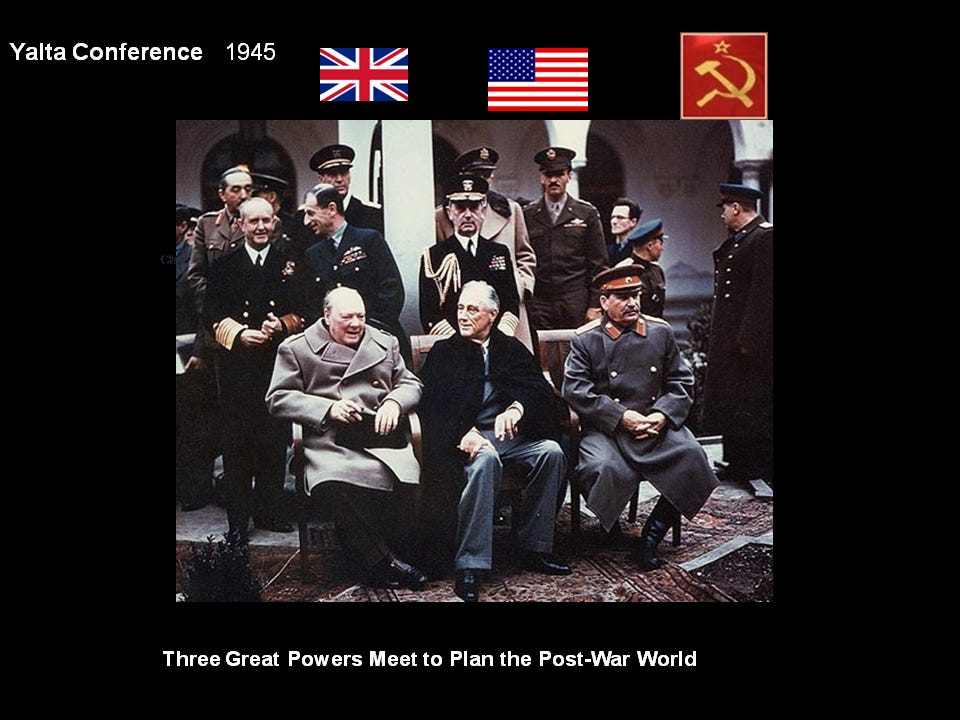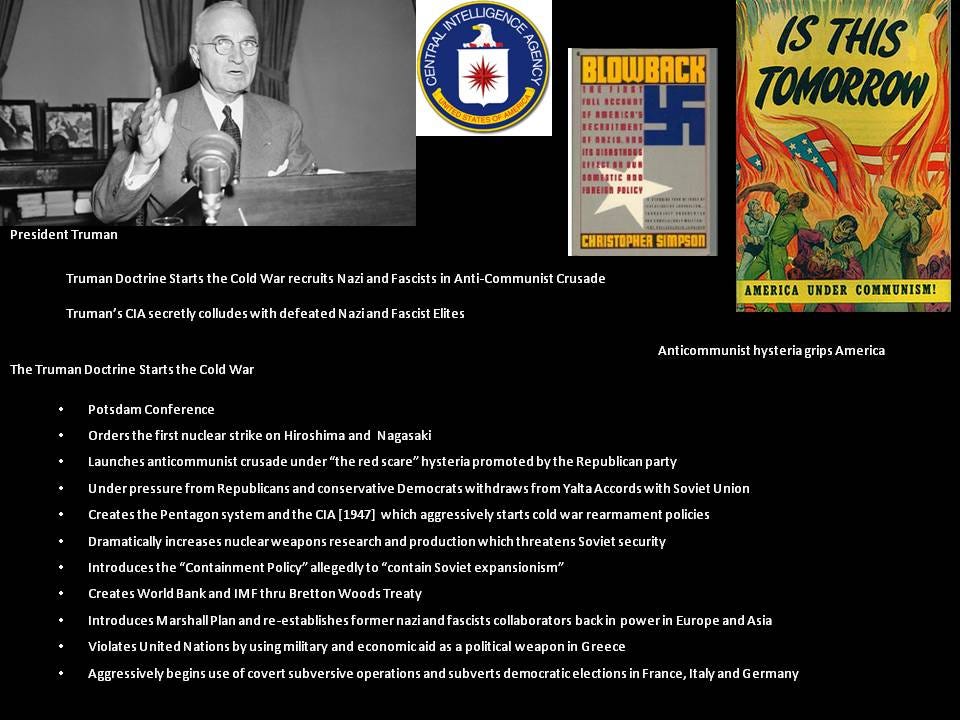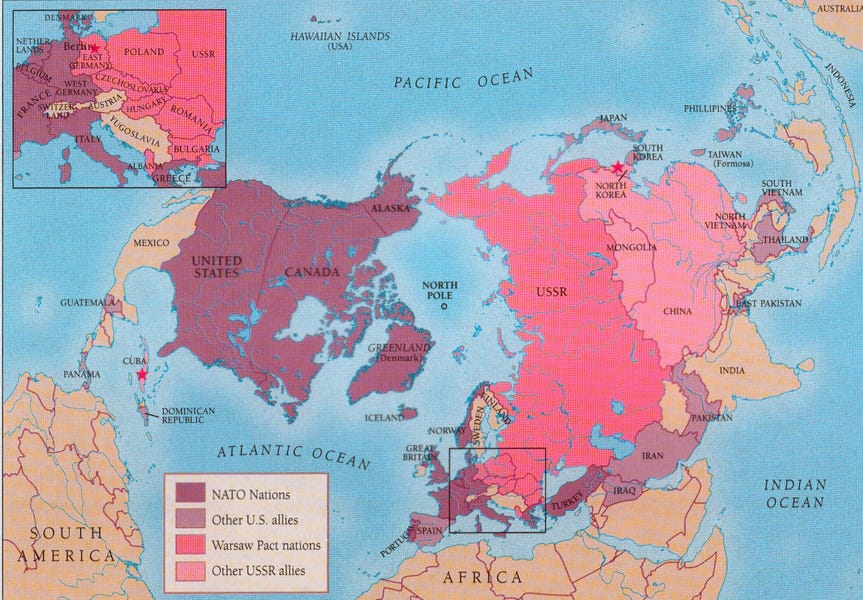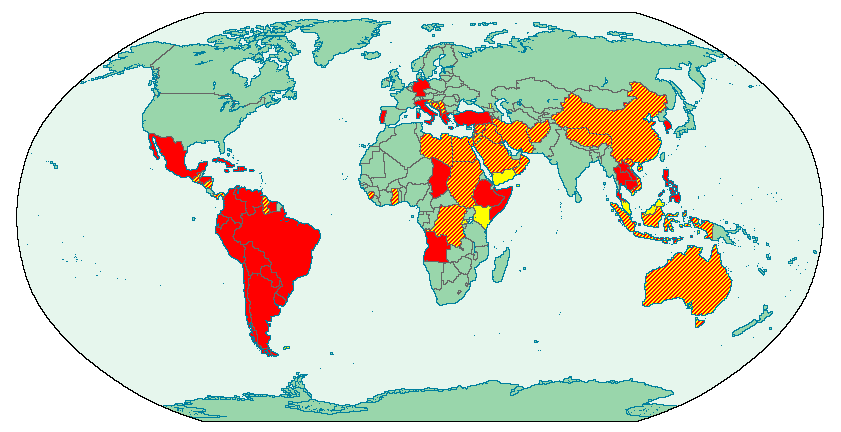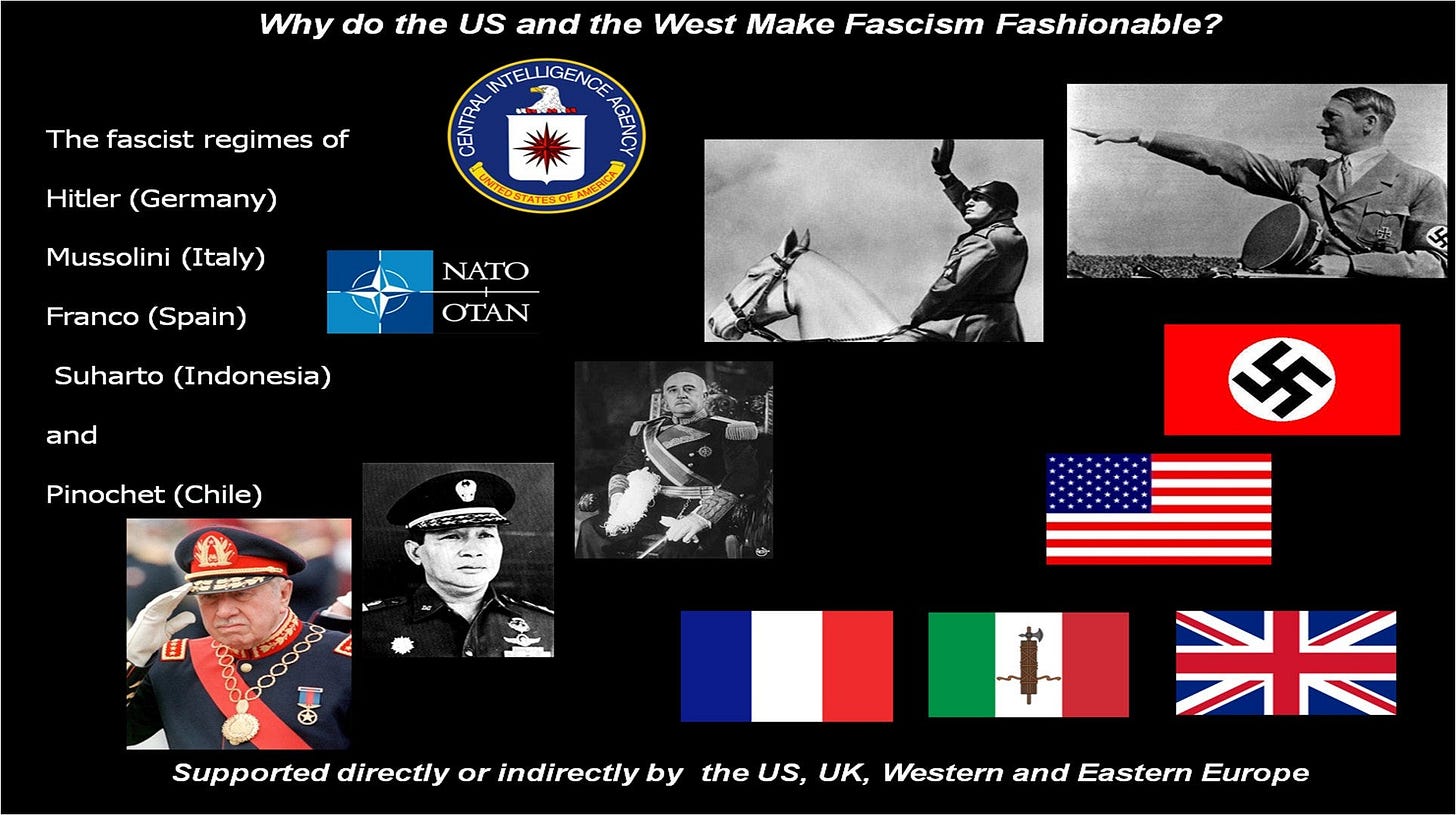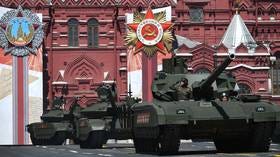World War II Really Never Ended. Why?
US elites’ cold war fanatical anti-communism betrays the victorious WWII US/USSR anti-fascist alliance.
Did World War II Really Ever End?
Conventional WWII Histories have an Anglo-American Western-centric bias tending to downplay the reality that World War II was principally a war of western empires vying for the ultimate prize: The Conquest of Eurasia between Western Powers US, UK, Europe vs. Nazi Germany, Italy and Japanese fascist empires.
WESTERN COLD WAR HISTORIANS RE-WRITING HISTORY:
Cold War Ideological Bias of Western-Centric Histories of World War II
Creating a false Nazi / Soviet historical comparisons
Richard Overy, historian & author Soviet Communism v German Nazism discusses the conventional western cold war histories of World War II and why they are creating a false Nazi / Soviet historical comparison which formed the basis for western cold war histographies of World War II.
Truman Doctrine disavows the US/USSR Yalta agreements. World War III, aka, Cold War Starts.
World War II Really Never Ended. Why?
Western memory of WWII is basically fan fiction
Trump needs a serious History Lesson US did most to win both world wars – Trump
Past is Prologue: April is the Cruelest Month for Nazis and Imperialists: A History of Two Wars
Cold War 1.0, aka, World War III, never ended.
Prof. Sakwa’s new book on Cold War 2.0 misses the entire point: Cold War 1.0, aka, World War III, never ended. It merely continued into a new phase against Russia, China and Global South/Eurasia.
Cold War 2: Europe gripped by war fever, stuck in escalation against Russia – Prof. Richard Sakwa
On this episode of Going Underground, we speak to Richard Sakwa, professor of Russian and European Politics at the University of Kent and author of ‘The Culture of the Second Cold War’. He discusses Friedrich Merz becoming chancellor and Germany’s pursuit of a ‘suicidal’ foreign policy, the negotiations to end the Ukraine proxy war in Istanbul and Donald Trump’s rapprochement with Russia. He also talks about the growing backlash in Europe against the increased militarism and conformational foreign policy, the campaign to blacklist him by the British secret service, the political West’s militant campaign to spread neoliberalism and the portrayal of any other system as ‘evil’, his classification of current geopolitical conflicts as a Second Cold War, why the political West’s dominance is under challenge like never before, and much more.
Truman’s Yalta Betrayal of USSR
Truman’s Yalta Betrayal of USSR begins after death of FDR who negotiated with Stalin the post-war world order with the understanding that the US and USSR would take the lead through collaborative efforts in reconstructing a war-torn Europe and creating a United Nations system to replace the failed League of Nations.
Yet, western anti-communist elites including Truman and Churchill colluded to systematically disavow Yalta which would lead a confrontation with the USSR by enunciating and implementing Churchill’s “Iron Curtain Speech” which was to set the tone of future ideological cold warfare doctrines and resurrected Euro-Nazism/Fascism under the guise of US national security state alliances from NATO in Europe and throughout the rest of the post-war world.
Truman’s Yalta Betrayal of the US/USSR Alliance and Agreement leads to Cold War era
Roosevelt and Truman on Yalta: The Origins of the Cold War on JSTOR
Truman/Churchill Cold War Anti-Communist Doctrine
U.S. Containment Policies were not only meant to "contain" the alleged Soviet threat of "world domination", which in reality was based on an exaggerated 'threat' conjured up by U.S. 'red scare' propaganda campaigns such as 'McCarthyism', but to contain the threat of national independence movements that threatened market access to U.S. multinational corporate interests in the Global South.
The Rise of the cold war US National Security State Empire.
World Map of US and UK Government Interventions Since 1945
http://us-uk-interventions.org/
When Nazis and Fascists Become America’s “Anti-Commie Good Guys.”
Truman/Churchill Cold War Anti-Communist Doctrine and US national security state elites embrace defeated Nazis and Fascists in cooperative cold war anti-communist crusades.
Russia must crush resurgent Nazism in West – security chief
Moscow must crush Nazism, which has resurfaced in the West in recent years, Russian Security Council Secretary Sergey Shoigu has said.
On Tuesday, ahead of the 80th anniversary of victory in the Great Patriotic War – Russia’s term for the 1941-1945 Soviet war against Nazi Germany – Shoigu emphasized the “enormous price” paid by the USSR in defeating Nazi Germany.
“The multinational people of Russia have learned well the lessons of the Great Patriotic War against fascism,” Shoigu wrote in Rossiyskaya Gazeta. The secretary served as defense minister from 2012 to 2024. He mentioned nearly 27 million combat deaths and 6.5 million additional deaths from starvation and disease during the war against the Nazis.
“Today we are obliged to do everything to defeat the resurrected Nazism,” Shoigu stressed. This imperative has “determined one of the main goals” of Moscow’s Ukraine campaign.
“The European elites, who are being incited and patronized by London and Paris, continue to make loud statements about inflicting a strategic defeat on Russia... NATO and the EU have launched programs aimed at preparing the collective West for a direct military conflict with Russia,” he said.
Those “aggressive steps” by the West “are being justified by Russophobic fabrications – in the best traditions of Goebbels’ propaganda,” the security chief stressed, referring to Joseph Goebbels, who was Nazi Germany’s propaganda minister from 1933 to 1945.
“In order to avoid a repetition of the horrors of the war years, there is an urgent necessity to protect the country from a variety of external and internal threats” by further boosting the military, developing the economy and investing in science and education, he said.
In late April, former Russian President Dmitry Medvedev, who now serves as deputy chairman of the Security Council, also insisted that “a real de-Nazification is required. Nazism needs to be rooted out not only in Ukraine, but in all of Europe.”
Fyodor Lukyanov: The West is dismantling the foundations of 1945
Why the cracks in the World War II settlement threaten global stability
FILE PHOTO: A T-14 Armata main battle tank during a Victory Day military parade in Red Square in Moscow, Russia. © Ramil Sitdikov / Host Photo Agency via Getty Images
Eighty years is a long time. Over such a span, the world changes almost beyond recognition, and events that once felt close fade into legend. Yet while history may become distant, its imprint remains. The Second World War created a political order that shaped global affairs for decades – an order many assumed was permanent. But today, the world is shifting rapidly and irreversibly. The events of the first half of the 20th century are no less significant, but their role in contemporary politics is no longer the same.
The war’s outcome, culminating in the defeat of Nazism, defined the modern world order. In many ways, it was seen as a near-perfect struggle: a battle against an unquestionably aggressive and criminal regime that forced nations with deep-seated ideological differences to set aside their disputes. The Allied powers – divided by political systems and long-standing mistrust – found themselves united by necessity. None of them entered this alliance out of pure goodwill; pre-war diplomacy was focused on self-preservation and maneuvering to deflect the worst consequences elsewhere. Yet when the existential threat became clear, those ideological rifts were temporarily bridged. It was precisely because of this that the post-war order proved so resilient.
This framework weathered the storms of the Cold War and even lingered into the early 21st century, despite major shifts in the global balance of power. What helped hold it together was a shared moral and ideological narrative: the war was seen as a fight against absolute evil, a rare moment when the divisions between the Allies seemed secondary to their common cause. This consensus – centered around the defeat of Nazism and symbolized by milestones like the Nuremberg Trials – gave moral legitimacy to the post-war order.
But in the 21st century, that shared narrative has started to fray. As it weakens, so too does the stability of the world order it helped create.
One key reason lies in Europe’s own internal transformations. In the post-Cold War era, Eastern European countries – long vocal about their dual suffering under both Nazi and Soviet regimes – have pushed a revisionist interpretation of the war. These nations increasingly define themselves as victims of “two totalitarianisms,” seeking to place the Soviet Union alongside Nazi Germany as a perpetrator of wartime crimes. This framing undermines the established consensus, which had placed the Holocaust at the moral center of the conflict and recognized European nations’ own complicity in allowing it to happen.
The growing influence of Eastern European perspectives has had a ripple effect. It has allowed Western Europe to quietly dilute its own wartime guilt, redistributing blame and reshaping collective memory. The result? An erosion of the political and moral foundations established in 1945. Ironically, this revisionism – while often framed as a push for greater historical “balance” – weakens the very liberal world order that Western powers claim to uphold. After all, institutions like the United Nations, a pillar of that order, were built on the moral and legal framework forged by the Allies’ victory. The Soviet Union’s enormous wartime contribution, and its political weight, were integral to this architecture. As the consensus around these truths crumbles, so too do the norms and structures that arose from them.
A second, subtler factor has also contributed to the unraveling. Over eight decades, the global political map has been redrawn. The end of colonialism brought dozens of new states into existence, and today’s United Nations has nearly double the membership it did at its founding. While the Second World War undeniably affected nearly every corner of humanity, many of the soldiers from the so-called Global South fought under the banners of their colonial rulers. For them, the war’s meaning was often less about defeating fascism and more about the contradictions of fighting for freedom abroad while being denied it at home.
This perspective reshapes historical memory. For example, movements seeking independence from Britain or France sometimes viewed the Axis powers not as allies, but as leverage points – symbols of the cracks in the colonial system. Thus, while the war remains significant globally, its interpretation varies. In Asia, Africa, and parts of Latin America, the milestones of the 20th century look different from those commonly accepted in the Northern Hemisphere. Unlike Europe, these regions aren’t pushing outright historical revisionism, but their priorities and narratives diverge from the Euro-Atlantic view.
None of this erases the war’s importance. The Second World War remains a foundational event in international politics. The decades of relative peace that followed were built on a clear understanding: such devastation must never be repeated. A combination of legal norms, diplomatic frameworks, and nuclear deterrence worked to uphold that principle. The Cold War, while dangerous, was defined by its avoidance of direct superpower conflict. Its success in averting World War III was no small achievement.
But today, that post-war toolkit is in crisis. The institutions and agreements that once guaranteed stability are fraying. To prevent a complete breakdown, we must look back to the ideological and moral consensus that once united the world’s major powers. This isn’t about nostalgia – it’s about remembering what was at stake and why that memory mattered. Without a renewed commitment to these principles, no amount of military hardware or technical measures will ensure lasting global stability.
Victory Day reminds us of the immense cost of peace – and the dangers of forgetting its foundations. As the geopolitical landscape shifts, it is this lesson that remains most vital.
This article was first published in the newspaper Rossiyskaya Gazeta and was translated and edited by the RT team
"Основа, которую нельзя потерять". Федор Лукьянов - о влиянии Второй мировой войны на политический мир
Original Russian article
This article was first published in the newspaper Rossiyskaya Gazeta and was translated and edited by the RT team
Вторая мировая война создала политический мир, к которому мы привыкли и который считали неизменным
FILE PHOTO: A T-14 Armata main battle tank during a Victory Day military parade in Red Square in Moscow, Russia. © Ramil Sitdikov / Host Photo Agency via Getty Images
Итоги самого крупного и кровопролитного столкновения в истории определили мировой порядок. Борьба с нацизмом и его союзниками стала в некотором смысле идеальной схваткой. Неоспоримо античеловеческий, агрессивный и преступный характер гитлеровского режима сплотил силы, которые в другой ситуации никогда не оказались бы по одну сторону линии фронта. Они этого и не хотели, весь предвоенный период - маневрирование в попытках избежать самых негативных последствий для себя и по возможности перенаправить их на кого-то еще. Однако пришлось отложить непримиримые (считавшиеся идеологически экзистенциальными) разногласия, и, пожалуй, именно по этой причине установившиеся рамки оказались прочными. Они пережили ожесточенную холодную войну и примерно полтора десятилетия после нее, хотя расстановка сил изменилась кардинально.
Устойчивость была связана прежде всего с морально-идеологической трактовкой Второй мировой войны, которая оставалась общепринятой: борьба против абсолютного зла, на фоне которого даже глубокие разногласия его противников имели второстепенное значение. Но это представление стало расшатываться и сходить на нет в XXI веке. А вместе с ним и незыблемость мирового порядка, как он установился в середине прошлого столетия.
Причин тому несколько. Наиболее очевидная - изменения, которые произошли в Европе. На передний план в силу своеобразной логики развития после холодной войны выдвинулись восточноевропейские страны, которые давно отстаивают идею о "двух тоталитаризмах", развязавших Вторую мировую. Соответственно, себя они идентифицируют в качестве главных жертв войны, пострадавших от обоих. Подобное уравнивание подрывает прежний политический консенсус, который некоторые называют "нюрнбергским", включающий, кроме прочего, представление о Холокосте как о центральном преступлении войны. И вине европейских наций за то, что они его допустили.
Почему интерпретация группы не самых значительных государств постепенно взяла верх - тема для отдельных рассуждений. Вероятно, один из мотивов - стремление западноевропейцев как раз снизить масштаб собственной вины и перераспределить груз ответственности. Но, будучи запущенным, данный процесс ведет к эрозии всей послевоенной конструкции. Как ни парадоксально, и того либерального мирового порядка, за который активно выступают западные страны. Ведь во многом и он основывался на единстве оценок, как они установились в 1945 году. Сама Организация Объединенных Наций являлась продуктом этого самого либерального порядка, просто вес Советского Союза был настолько велик, что игнорировать его было совершенно невозможно. Фактический ползучий пересмотр итогов Второй мировой логически ведет и к расползанию норм, из них вытекающих.
Вторая причина менее очевидная. За восемьдесят лет политическая карта мира стала совсем другой. Массовая деколонизация привела к появлению десятков новых стран, число государств - членов ООН почти учетверилось. Конечно, война потому и была мировой, что коснулась значительной части человечества. На фронтах в Европе и на Тихом океане под флагами своих метрополий сражались представители колоний, как бы сейчас сказали, Глобального Юга. Однако вполне объяснимо, что не все из них воспринимали тогдашние события как битву за собственную свободу. Более того, силы, стремившиеся обрести независимость, например, от Британии или Франции, могли видеть в их врагах ситуативных союзников. И как минимум относиться к происходящему иначе, чем сами европейские нации. Вообще для бывших колоний вехи ХХ века несколько отличаются от тех, что считаются само собой разумеющимися в Северном полушарии. Откровенного ревизионизма, как в Европе, в Азии и Африке, конечно, не будет, вопрос лишь в иерархии приоритетов и нюансах, которые там другие.
Все вышесказанное не отменяет самого главного. Вторая мировая война и сегодня остается определяющим событием для всего международного развития. Относительно прочный мир, установившийся после нее, базировался на понимании, что ничего подобного допустить нельзя. Набор ограничителей - от международно-правовых норм до ядерного сдерживания - работал на достижение этой цели. Боже упаси идеализировать холодную войну, но избежать худшего она позволила.
Сейчас прежний инструментарий переживает кризис. И задача - не допустить его окончательного распада. Но для этого не обойтись без возвращения к тому самому идейному и моральному консенсусу, который был основным результатом Второй мировой войны. Говоря по-простому, памяти, чем была эта война и что стояло на кону. Без нее никакие военно-технические меры не обеспечат международную стабильность.





